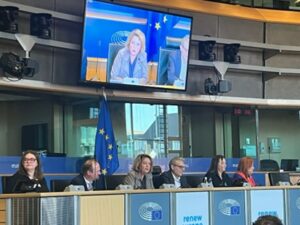
The message was loud and clear at the Impact of Rare Diseases: More Than You Can Imagine event in the European Parliament on March 5: people living with rare diseases, including those with HoFH and FCS, cannot afford to wait any longer for faster diagnoses, better treatments, and equitable care.
Co-hosted by MEPs Stine Bosse (Renew, Denmark) and Adam Jarubas (EPP, Poland) in collaboration with EURORDIS-Rare Diseases Europe, this event marked Rare Disease Day 2025 with strong demands for improved EU policies, funding, and cooperation to address the severe gaps in rare disease care.
Our network was represented by Magdalena Daccord and Maja Bartoszewicz-Moritz, highlighting the crucial challenges faced by the HoFH and FCS community. The discussions struck a chord, emphasizing:

Delayed Diagnosis Is Life-Threatening
The powerful testimony of Adéla Odrihocká, an award-winning advocate from the Czech Republic, shed light on the devastating impact of years-long diagnostic odysseys. For conditions like HoFH and FCS, early detection is essential to prevent severe complications—yet many patients still endure prolonged waits for diagnosis and appropriate care.
The Cost of Inaction Is Too High
Tim Wilsdon of Charles River Associates presented new data estimating that rare diseases cost the EU €250 billion annually—six times more than non-rare diseases. Investing in early screening, genetic testing, and specialist care for HoFH and FCS is not just vital for patients but also economically justified.
Access the full report here.
MEPs Demand Change
MEP Stine Bosse called for cross-border collaboration to ensure access to treatments, while Vlad Voiculescu (Romania) emphasized the need for solidarity and stronger newborn screening policies. MEP Tilly Metz (Luxembourg) underscored the importance of holistic care, including mental health support for those living with rare conditions.
A European Action Plan for Rare Diseases
Avril Daly, President of EURORDIS, urged engagement with the new European Commission to secure a long-term strategy for rare diseases. “We can do things cheaper and smarter,” she stated, while Virginie Bros-Facer, CEO of EURORDIS, reinforced the urgency: “Discussion alone is not enough.” A European Action Plan for Rare Diseases must ensure clear objectives, measurable progress, and real political commitment—because every day without action means lives at risk.
Thomas Minten delivered a compelling intervention on the state of newborn screening, leaving a significant impact in the room.
Sebastian Honoré gave an insightful talk on “genetics, omics, and economics”, emphasizing the need for fair and timely access to treatment.
These voices—and many others—continue to champion change in rare disease policies and healthcare access across Europe.
The rare disease community has spoken: we cannot afford to wait. It is time for the EU to act decisively and implement a comprehensive strategy that addresses the urgent needs of people with HoFH, FCS, and all rare diseases.
Read more on the conference and the full recap here.